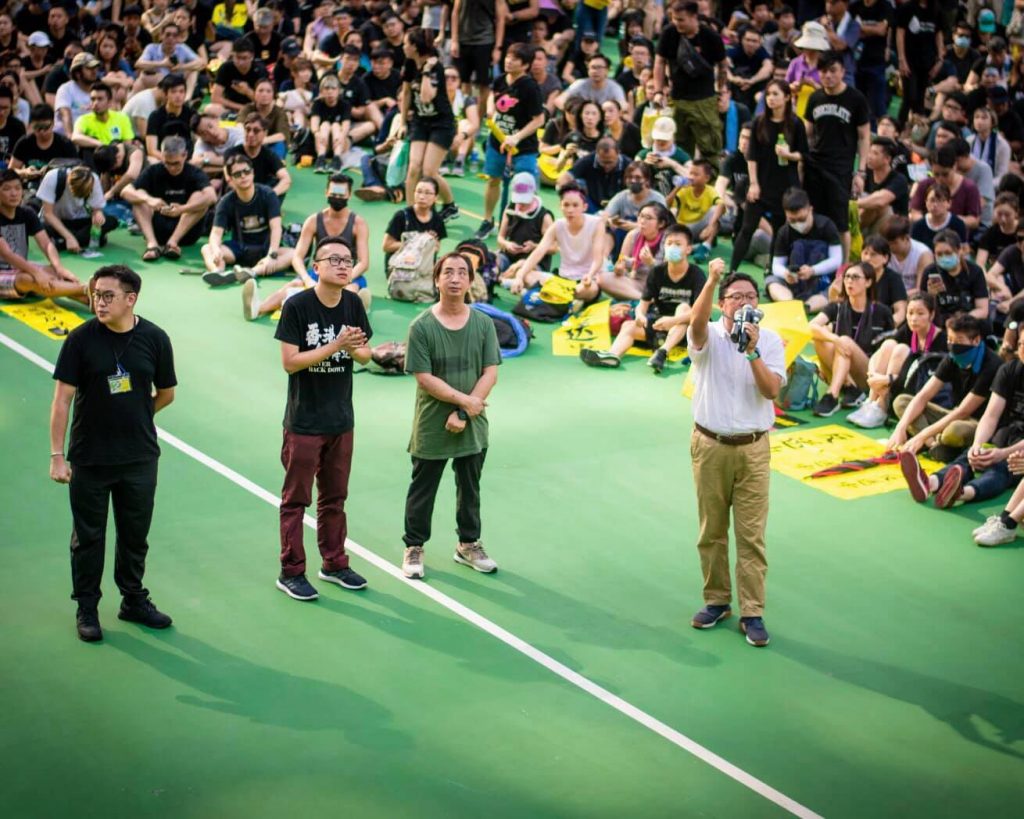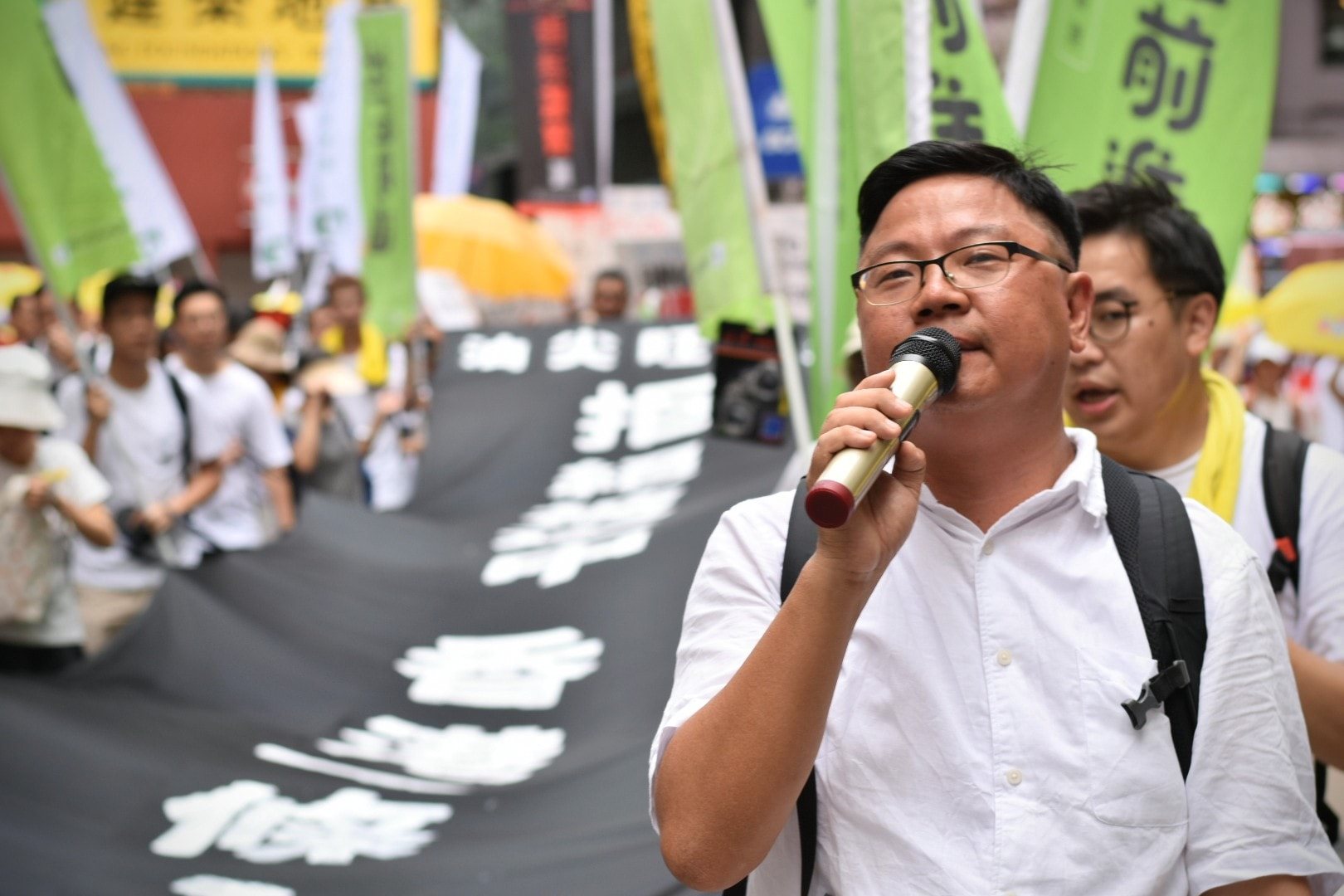Editor’s note: All five Community March candidates were elected to district council on November 24, 2019. The headline of this article has been updated to reflect this.
Hong Kong’s movement approaches its half-year mark, and the state’s violent repression against protesters is only increasing. Elections for Hong Kong’s district councils, which oversee local issues, are being held on Sunday in what many view as a referendum on the movement. District council elections are the only fully democratic ones in the city, and “pan-democratic” politicians are contesting all the seats for the first time.
Lausan’s Promise Li interviewed Derek Chu Kong-wai (朱江瑋), district council candidate for Mong Kok South (旺角南) of the progressive, Kowloon-based political group Community March (社區前進). A fairly new alliance between long-time social movement activists and younger activists, Community March centers working-class issues in their political platform, along with the Five Demands. Members have organized grassroots tenants in Mong Kok against displacement, and also played an integral part in organizing working-class people in Kowloon in support of the anti-extradition bill movement this year. Chu himself is a veteran of Hong Kong social movements, involved in campaigns like the 2007 ironworkers’ strike, 2011 ThyssenKrupp Elevator workers’ strike, and other solidarity work for Mainland workers’ struggles. Chu tells us about the successes and failures of this movement in addressing Hong Kong’s structural problems, and the importance of mobilizing the lower classes for Hong Kong’s liberation.
This interview has been translated from Cantonese and edited for clarity.
Promise Li: Your organization, Community March, is quite new, though you and other founding members have been very active in social movements. Tell us about your campaign and your values.
Derek Chu Kong-wai: Our shared political platform centers on labor issues, the rights and voices of Hong Kong’s many street hawkers, street markets, children’s rights, and other policies that center grassroots issues and the working classes. Labor and feminism are two big issues, especially since many of our core founding members have shared backgrounds in doing NGO and other community work. For example, we have members in key positions in organizations like The Association for the Advancement of Feminism (新婦女協進會), advocating for women’s issues in the workplace. Other members come from community organizing backgrounds with low-income communities, which is why we center policies in support of women and other marginalized identities’ issues in our platform.

In addition, we look to advocate for more local or regional issues relating to how Legco functions. For example, Legco proceedings and meetings can be very inaccessible to many of the lower-class communities in which we are based. So if we win, we want to promote more transparency in the legislative process from simply making live streams more accessible, to allowing citizens a more direct say in policymaking, not just fighting for pieces of the pie.
Community March has been organizing in the current movement since its beginning this summer, so our political platform, of course, directly supports the Five Demands.
This is the first time we are running a slate of five members together for the official district election. We are all based in the Yau Tsim Mong area in Central Kowloon. But for now, we operate less like a party in a traditional sense than a platform (平台). To be clear, while we have clear political stances, we do not yet have a developed long-term political plan. Like the movement in many ways, we are focused on some short-term goals we can achieve for now as a collective platform through these elections. We have similar goals, of course, but we need more time to understand each other in practice as close allies.
PL: How would this emphasis on structural problems, like class and gender exploitation, distinguish or align your organization with other parties and their political platforms?
DC: Most Hong Kong parties, despite their names, are more like coalitions or alliances for electoral purposes, and in Legco, people tend to end up advancing fairly individual political goals and agendas. Hong Kong electoral parties are split between two main broad camps: pro-establishment, which we are definitely not part of, and pro-democracy, within which there are further factions. There are the traditional liberal democrats and the relatively new parties that are now called “localist.” We are not localists, mainly because we are against all kinds of exclusionary policies toward marginalized peoples.
One reason we came together as Community March is to differentiate ourselves from localists. Although we accept that we are often in a situation where we stand with them as allies and sympathize with many of their concerns, we disagree with some of the new localists’ emphasis on discriminating against Mainland people, advocating for policies that exclude them from public benefits. We disagree with these things, though we understand how these views came to be.
We are not localists, mainly because we are against all kinds of exclusionary policies toward marginalized peoples.
We also disagree with the liberal democrats, because they fundamentally want to preserve the system and the status quo. Furthermore, they have not provided clear road maps and goals for their constituents. Of course, we don’t have a clear sense of our long-term direction yet either. But ultimately, we know we are not satisfied with their model of not providing clear political values and goals for their constituencies.
PL: The Five Demands are not explicitly class-based, nor do most of them address the root problems in Hong Kong society that you identified. What is the place of marginalized peoples in this movement, and how can electoral politics work with the present limitations of the movement to amplify these voices?
DC: We think social movements need to be sustained by organizations. Even though our long-term plan is unclear yet, our members are clear that we have to begin political practice from the grassroots level, especially female workers and street hawkers, because in many ways these classes have been the main target of China’s strategy. Many of them form the basis of the establishment’s main pool of voters and the PRC government is keen on creating divisions within the working classes, so we think that any social movement that does not center on these people will not be successful. Indeed, China has been laboring to diffuse anti-establishment energy (反動性) in the working classes to secure its mandate to state power. People have been encouraged for many years to think that “might makes right” (成王敗寇).
And though the movement’s beliefs and orientation are becoming more and more clear, its form is more and more unclear. Localists advocate for discriminatory policies at times and not only do we not agree, but we think it is impossible to build a movement on these terms. But localists have their appeal because they identify something about Hong Kong and China’s dynamics that the older liberal democrats miss in their analysis. This idea of centering on “Hong Kong identity” can attract and energize many people, as we have seen in this movement. But, if you think about it, the cops beating people up on the streets—they are Hongkongers too! Blue ribbons are Hongkongers, those who stand against the democratic process are Hongkongers, and capitalist tycoons like Li Ka-shing are Hongkongers too. So “Hongkonger” as a political framework has its limits; each class has its own power and interests, and we need a different kind of analysis.
For example, elderly people: which of them support the movement and which do not? These are important questions to ask. We believe that working people, female blue-collar workers, and so on have explosive political potential. This is not quite developed in this movement, but Community March came together because we recognize this energy and want to build on it.
Also, the “Three Strikes” (三罷) has been recognized as the peaceful faction’s (和理非) most important weapon—even by the more direct action–focused elements, which are a complicated mix of anarchists, localists, and other groups. Even they recognize the strikes’ potential, but to achieve it, we need to organize. We can’t just rely on will. This is not something that can be solely achieved by the street battle strategy. We hope to be able to amplify these goals in the long run. Today, Hong Kong’s movement touches on an important geopolitical nerve, framed by the U.S.-China trade war. But in reality, this is just the first act (揭幕戰): we are sure to have more struggles before 2047, and we need to prepare for them.
We believe that working people, female blue-collar workers, and so on have explosive political potential.
PL: It has been difficult to clearly articulate and organize around these concerns, given the movement’s diffuse structure. What are some strategies that can center these issues?
DC: We are just starting out, so we don’t expect that we can change people’s hearts and the movement overnight to take up these demands. We need to be honest that these issues are not at the center of the movement right now. In fact, many protesters view lower-class workers as conservative elements; this feeling or judgment has made class concerns automatically neglected in many ways. We will, of course, continue to advocate for these concerns in the movement and do our part. It’s not like no one is making structural critiques in Hong Kong—there just aren’t a lot, and those forces are organizing too. And it is important for us to show some concrete results for the Hong Kong people beyond this movement.
Of course, this is a difficult task, but not an impossible one. The movement has opened up lots of positive alternatives to the usual way of life in Hong Kong. There were many cleaning workers who were also risking their safety to defend with the frontline protestors, which usually wouldn’t happen. Before, no one would care about something like the Three Strikes. It’ll take a lot more organizing and political education to keep developing these moments of solidarity, but this is an important moment of education and experience for people.

In Hong Kong, most people deeply believe in capitalism, at times to the point of thinking that it is what makes the city good, even as a way to distinguish Hong Kong from China. This mindset is a reactionary influence on the working classes, and reinforces people’s cold, apolitical stances. But through this movement, some of these ideologies are being counteracted. For one, the numerous instances of community mutual aid demonstrate that people are starting to recognize that there are things more important than money and work. To me, this is a great challenge to capitalist ideology in the city. We are now just lacking clear avenues and victories to keep us learning and growing. These anti-capitalist moments are in competition with the more reactionary elements, and we have yet to see which pole will become more dominant.
PL: What are some important ways to advocate for progressive issues in Legco, and how can focusing on district elections help at this point in the movement?
DC: There used to be three main ways we can be effective in the Legco, but now only two of them are really viable. The first is to directly wrest more political power for the people and our platforms, but this is becoming increasingly unlikely. Our already-limited veto power is further diminished after the disqualification of pan-democratic legislators in 2017. But another way we can still make use of Legco is to fight against the privatization of public resources, like retaining benefits for medical workers, promoting more democratic decision-making for local development projects, advocating against “white elephant” infrastructure projects, and ultimately providing checks on where the money is going.
People are starting to recognize that there are things more important than money and work. To me, this is a great challenge to capitalist ideology in the city.
Lastly, elections and Legco representation can be used to stimulate and provide a base for mass movements. For example, millions of people were on the streets at the beginning of the anti-extradition bill protests. This is really powerful, but how can we sustain this momentum? One can’t be on the streets every day of the year. And so elections can be a way to organize and build networks to sustain social movements. Unions used to play more of this role, along with many grassroots mutual aid groups and civil society organizations. Electoral politics is just one, albeit crucial, avenue to sustain these community networks.
I also think the electoral fight and street mobilization operate on different terrains, but both need to work in close coordination with each other. Direct action works because there are appropriate networks of organizations and bases to facilitate strategies of attack and defense. The strength of some of these networks are clear: without churches, safe houses, mutual aid networks, this movement wouldn’t have the same level of success. Even when people can’t fight anymore on the streets, they need to feel empowered and secure to vote, backed by these base forces.
A final key aspect is the role of reporters: if they weren’t laboring to advocate loudly for us every day, the movement would be extinguished very quickly. The quick repression of labor and social movements in China is a good example of this. Journalists match the movement’s energy and help build and sustain momentum, and the voices of pan-democratic legislators or other key political figures are good ammunition for their work.




